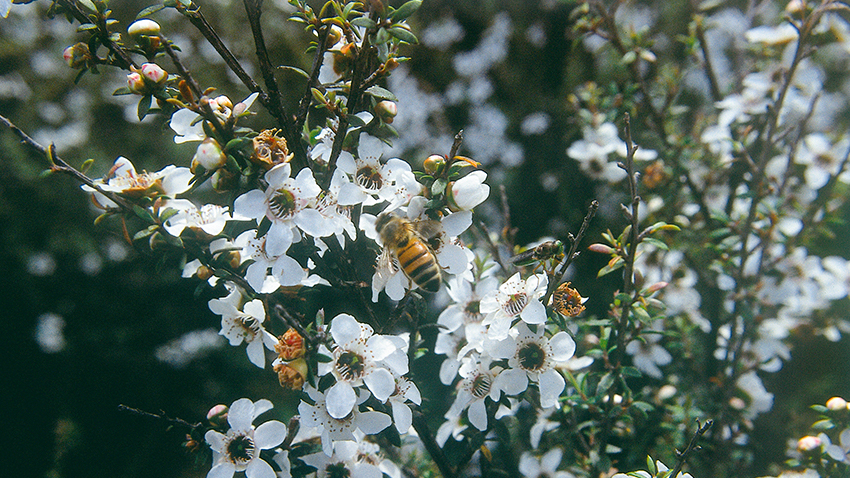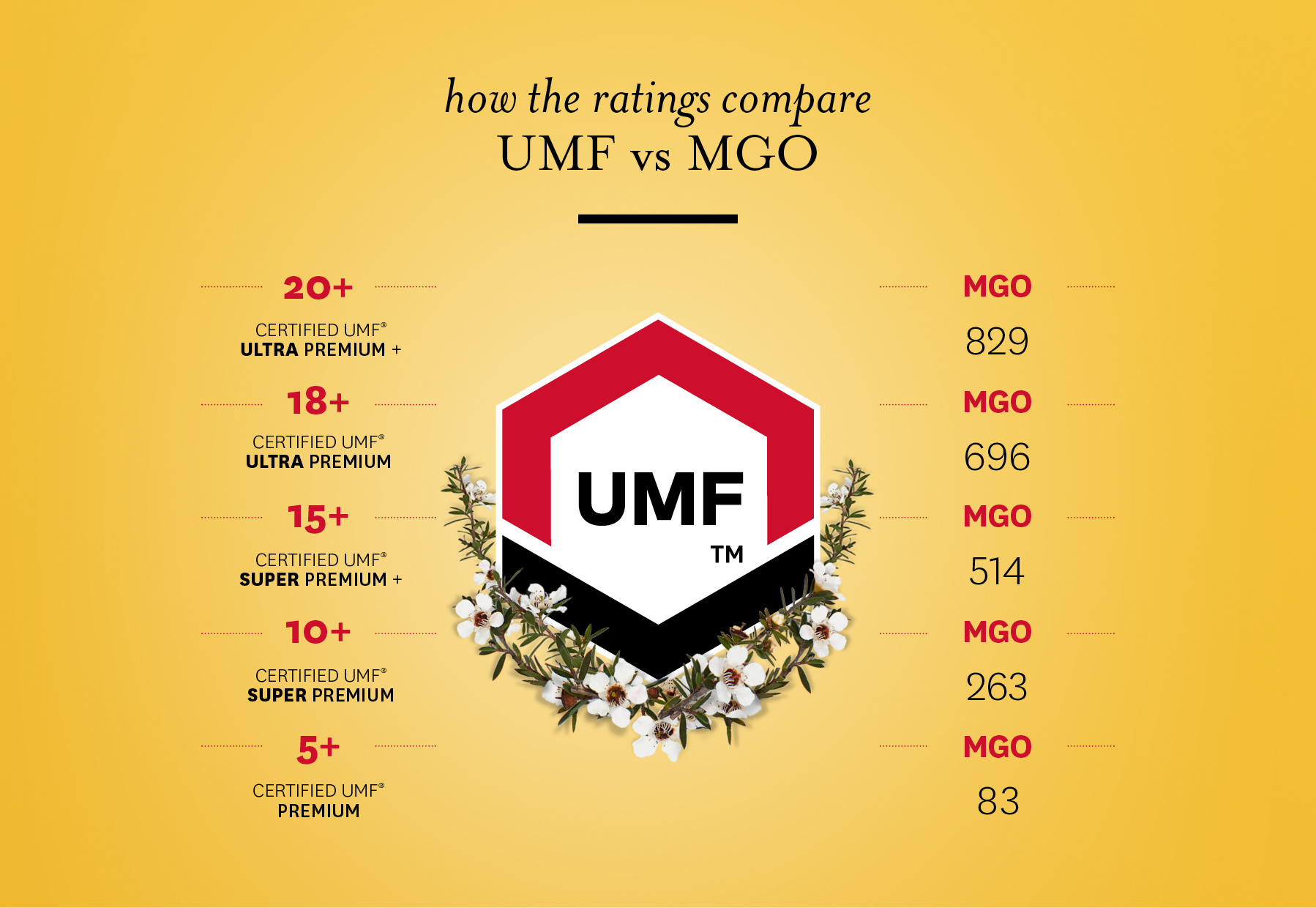New Zealand is famous for it's Manuka Honey. Not only is it a delicious natural sweetener but it has some unique properties that earned it a title as a super-food. It’s time to learn about New Zealand Manuka Honey, why it’s so special and what to look for on the label when making your purchase of New Zealand’s own Manuka Honey.
What is Manuka?
Let’s start right at the beginning and find out what the ‘Manuka’ in Manuka Honey is. Manuka is a native New Zealand tree. It's official name is Leptospermum scoparium and is found all over New Zealand.
New Zealand Maori recognised the Manuka tree, with it's white flowers and small, pointed green leaves as being something special a long time before scientists did the research that agreed with them.
Most parts of the New Zealand Manuka tree were used in traditional Maori medicine (Rongoā Māori) to treat wounds, burns, inflammation and digestive complaints.

What is New Zealand Manuka Honey?
Honey is made when bees collect nectar from flowers. The type of flowers give the unique taste, colour and properties found in different types of honey. Manuka Honey is made when bees collect nectar from the Manuka tree.
What makes New Zealand Manuka Honey so special?
Manuka Honey has been thought to have some unique properties that make it more than just a natural sweetener. Traditionally honey has been used to treat wounds, improve the skin and aid digestion.
All honey contains a range of proteins, vitamins, minerals, enzymes, phenolic acids and flavonoids that may be responsible for the traditional benefits. However, Manuka Honey has something a bit extra.
Before scientists worked out exactly what it was in Manuka Honey that made it so special, they identified this special-something as Unique Manuka Factor, or UMF.
Then they found a unique property that makes New Zealand Manuka Honey something very special - a compound called Methylglyoxal (commonly referred to as MGO or MG).
Research has found that at certain concentrations MG/MGO has been shown to restrict bacterial growth. Additionally, when used on the skin, helps to reduce inflammation.
What should I look for on the label?
Not all Manuka Honey is created equally. So it’s important to know what to look for on the label, whether it’s a jar of honey or a honey skin care product.
- MGO/MG or UMF rating
MGO 250+ and above, or UMF 10+ and above is considered to be “medicinal grade”.
Here’s how the UMF and MG ratings line up

- Organic and non-organic Manuka Honey
Selecting organic or non-organic New Zealand Manuka Honey is your choice. What the “organic” label means is that the honey and everything the bees and flowers have been in contact with are able to be traced. This helps to make sure that there’s been no contact with pesticides, sprays or synthetic chemicals.
Certified organic honey can guarantee that their products aren’t just synthetic pesticide or herbicide or residue free, but the whole process of producing the honey is done sustainably and putting the needs of the bees first. Choosing a certified organic product means you have a guaranteed authentic organic honey.
- Raw
Although there’s no strict definition of “raw” honey, the “raw” is taken to mean that the honey has been processed at low temperatures. Generally less than 47 degrees Celsius (118 degrees Fahrenheit). Pasteurising or extracting honey at high temperatures is thought to reduce the amount of nutrients and antioxidants in the honey.
- Multiflora or monofloral
Some Manuka Honey may have the label “multifloral”. This means the honey contains nectar from Manuka and other flowers. Pure Manuka Honey may be labelled “monofloral”.
Honey, a natural sweetener
Honey is great as a natural sweetener in drinks, as an ingredient in food or a spread on crackers or warm toast. The sugar that honey contains is a combination of fructose and glucose. The amount of fructose compared to glucose varies depending on the type of honey and flower of origin.
White (table) sugar is a sugar called ‘sucrose’ and contains 100g sugar per 100g. Honey contains less, around 78g sugar per 100g. This is also less than the sugar content of coconut sugar.
Choosing honey is a lower-sugar sweetener option.
What does Manuka Honey taste like?
Manuka Honey has a rich, floral taste. It’s a golden honey but the higher MG /UMF Manuka Honeys are darker and more solid.
How do I use Manuka Honey?
Manuka Honey is available in so many different ways. You can eat New Zealand Manuka Honey or drizzle into your tea. It’s also an ingredient in many lozenges, throat sprays, creams, wipes, balms, and supplements
Depending on what you buy the storage and use-by dates will vary so always check the container.
If you buy a jar of Manuka Honey and it starts to crystalize (or granulate) it doesn’t mean the honey is out of date. It’s normal for honey to grow crystals. Keeping your jar of honey somewhere warm may help to reduce crystal formation. Don’t be tempted to heat your honey to remove the crystals. Heating honey to high temperatures (above 45-50 degrees Celsius) alters its chemical composition and can eliminate the benefits of the honey by killing the bacteria, enzymes and antioxidants that make honey so powerful. Heating can also affect the taste, texture and colour of your honey although it does not make it dangerous or toxic. Give it a stir and keep enjoying your Manuka Honey.
Who can’t use Manuka Honey?
New Zealand Manuka Honey, like other honey, shouldn’t be given to infants under 12 months old to eat. This is because honey may contain a bacteria called Clostridium botulinum that can cause severe sickness in infants due to their immature digestive system. This bacteria is usually harmless to adults and children over 1 year old, because the microorganisms normally found in the intestine keep the bacteria from growing. Using creams and balms that contain Manuka Honey is safe.
Using New Zealand Manuka Honey and honey products is safe when you’re pregnant or breastfeeding.
Although rare, if you’ve an allergy to honey then an allergic reaction will happen with Manuka Honey as well.
As Manuka Honey is considered an animal product people following a vegan diet tend to avoid honey. But it is enjoyed by many vegetarians.
That’s our introduction to New Zealand Manuka Honey
As you’ve guessed, it’s a favourite of ours. Uniquely New Zealand.
If you’re curious, and want to find out where we got our information, here are the references we used to get you the best over-view of what makes Manuka Honey our favourite.

